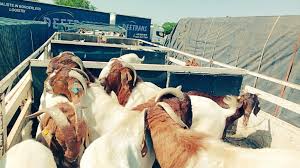Goat farmers adopt cross breeding technologies
GOAT breeding in Zimbabwe is gaining traction with farmers now adopting cross breeding technologies to grow the goat population and its quality.
A South Africa based Zimbabwean Boer goat breeder and exporter, Mr Ntandoyenkosi Ndhlovu said farmers are starting to value the small livestock unlike a few years ago when the populace did not rear goats for breeding purposes.
Farmers now breed Boer goats, Kalahari, and Savana bucks with indigenous goats to achieve desirable weights that will catch high returns for their investments. Goat farming in Zimbabwe is gaining momentum, especially when you follow how some local breeders are getting exceptional genetics.
“Communal farmers who didn’t have a know how on goat farming are starting to improve on reducing the kid mortality rate which is the major contributor to profit realisation,” said Mr Ndhlovu.
“The information that different farmers are sharing on social media channels, farmers are indeed learning and practically implementing. The exotic breeds are gaining popularity which also improves the carcass weight and growth rate when crossed with our local goats.
“This is important since the major target is to maximise profit.”
Mr Ndhlovu said despite the recent uptake into goat breeding, there is more to learn particularly on acquiring the right genetics.
He added that there is also a need to invest more in indigenous goats such as Matebele and Mashona goats to preserve genetics.
“Not all the communal farmers can afford these Boer, Kalahari and Savanna breeds, it is, therefore, an opportunity for other local players to take advantage. There is a promising market for goat meat export to the United Arab Emirates though there is a need of Halal certified abattoirs.
“If farmers can be united and come together in terms of clubs and associations, definitely we will meet the export demand but now there is still a lot of individualism which will make it impossible even to penetrate that market and satisfy it.”
Health consciousness, leather and milk value chain and religious festivities are among the major factors pushing goat meat demand in the United Arab Emirates.
The Government is already running a Goat Pass On Scheme, which is expected to uplift rural communities across the country where three million households are expected to benefit from this year until 2025.
The scheme will initially distribute 600 000 animals.
Under the Presidential Rural Goat Pass On Scheme, it is envisaged that this year, the Government will give out the first 600 000 goats, with at least five million goats expected in the market by 2025. — chronicle









